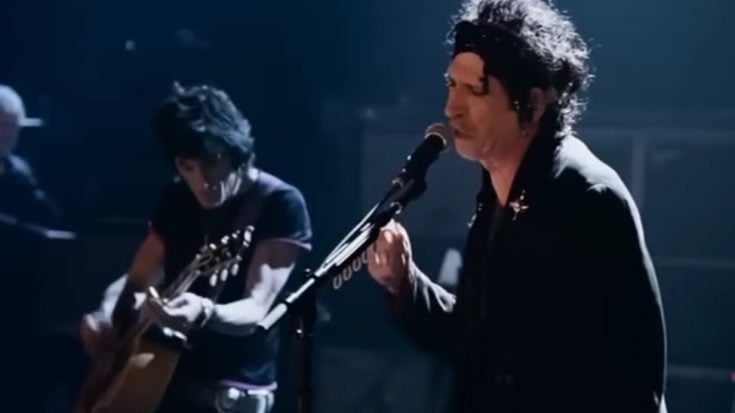1970s Rock Songs That Haven’t Aged Well In 2025

via RollingStones50yrs5 / YouTube
Rock from the 1970s still casts a long shadow over modern music. Many of the decade’s biggest anthems continue to thrive because of their craftsmanship, energy, and emotional pull. Whether it’s the rush of Born to Run, the sheer weight of Kashmir, or the communal joy of shouting along to Bohemian Rhapsody, the era produced songs that have proven nearly impossible to shake out of the culture.
But time has a way of reshaping how we listen. Social attitudes change, production styles evolve, and even the most beloved genres can feel out of step with new generations. Sometimes it’s the lyrics that age badly; other times it’s the production choices that instantly pin a track to a very specific moment. And in plenty of cases, radio saturation alone can drain a song of its original spark.
Not every hit from that decade has held up with the same strength. Some tracks that once felt daring or fresh now land with a thud, weighed down by themes that haven’t aged gracefully or by arrangements that feel trapped in the past. Others were simply played so relentlessly that all mystery and thrill evaporated. With that in mind, it’s worth revisiting a few ‘70s rock staples that no longer resonate the way they once did.
“Brown Sugar” by The Rolling Stones
“Brown Sugar” spent decades sitting high on the list of Rolling Stones staples, carried by that unmistakable riff and the swagger the band built its name on. It was everywhere — radio, stadiums, live sets — and for a long time, most listeners attached nothing but excitement to it. Fans treated it like one of the band’s defining achievements, and it remained cemented in their live performances well into the 21st century.
But the more closely people revisit the lyrics, the harder it is to defend the song’s storytelling choices. Its opening images alone are enough to pull modern listeners straight out of the groove. The track frames its tale around enslaved Black women through a voyeuristic lens, tying desire to violence in a way that was always uncomfortable, even if the culture at the time didn’t confront it head-on. Attempts to soften a few lines over the years didn’t change its core issues.
Because of that, the song’s legacy has shifted dramatically. The band eventually removed it from their setlists, acknowledging that this particular piece of their catalog doesn’t sit well with audiences anymore. “Brown Sugar” was once celebrated for its energy, but today it’s remembered far more for the problems buried inside its lyrics than for the music that originally made it a hit.
“Stairway to Heaven” by Led Zeppelin
There was a time when “Stairway to Heaven” felt almost untouchable. Zeppelin packed ambition into every layer of the track: a gentle acoustic opening, a slow-burning rise, and a final explosion of electric guitar that helped define the band’s mystique. It gave listeners a sense of movement, almost like the song created its own little universe for eight minutes.
But decades of constant airplay have done a number on it. The song became such a cultural fixture that the mystery evaporated, replaced by a reputation for being grandiose and self-serious. Younger rock fans often hear it for the first time through a wall of hype, only to find the experience weighed down by its own iconic status. Even the running joke about guitar shops refusing to let customers play the intro hints at how oversaturated the track has become.
The band members themselves haven’t exactly fought to protect the myth. Robert Plant has often distanced himself from the song, hinting that the magic faded long ago. For many listeners, those endless replays and countless amateur cover attempts drowned out the spark that once made “Stairway to Heaven” feel transcendent.
“Smoke on the Water” by Deep Purple
“Smoke on the Water” is one of those songs you can identify long before the band kicks in. That famous guitar line has been taught, shouted, hummed, and butchered by every generation of beginner musicians since the early ’70s. The backstory about the Montreux Casino fire is legendary, and for years the track was held up as a celebration of classic hard rock attitude.
The problem is that universal recognition can be a blessing and a curse. Once a riff becomes everyone’s first warm-up exercise, it stops feeling dangerous or inventive. “Smoke on the Water” ended up so overexposed that it almost turned into shorthand for generic rock — the kind of thing used in commercials, parodies, and sitcom punchlines. What once sounded defiant now lands closer to novelty.
Even the band has poked fun at their own creation, acknowledging how strange it is to have their most famous song tied to such a simple musical idea. It’s still a milestone in rock history, no question, but as a listening experience in 2025, it rarely hits with the force it had when Deep Purple first put it on tape.
“(You’re) Having My Baby” by Paul Anka
Paul Anka had an undeniable gift for writing melodies that stuck, and much of his catalog still holds up today. But “(You’re) Having My Baby” feels trapped in the softer side of 1970s pop, coated in layers of sentimental gloss that modern ears rarely respond to. It’s polished, tuneful, and gentle — yet somehow manages to feel cloying from the first chorus.
The bigger issue is how out of step the lyrics were with the conversations happening during the decade. Women’s roles, reproductive rights, and shifting household dynamics were at the forefront of cultural debate, and the song’s framing of pregnancy felt painfully one-sided even back then. Calling it “my baby” instead of “our baby” wasn’t just old-fashioned — it read as dismissive at a time when many listeners were craving something more honest and nuanced.
Its commercial success makes the whole story even stranger. The song topped charts, then quickly became a staple of “worst songs” lists once the initial glow wore off. Today, it survives mostly as a reminder of how quickly pop culture can move on when sentimentality crosses into self-parody.
“Afternoon Delight” by Starland Vocal Band
“Afternoon Delight” once rode the wave of cheerful innocence wrapped in coy sexuality, a combination that seemed harmless and fun in the mid-’70s. Its harmonies were bright, the melody was catchy, and the song’s playful tone made it an easy radio favorite. For a brief moment, it was exactly the kind of light, breezy hit that critics and listeners could agree on.
But what used to feel cheeky now reads as awkward. Its idea of sensuality hasn’t aged particularly well, especially compared to the funk and soul tracks of the same decade that still ooze charisma today. The lyrical winks and nudges land differently in a modern context, where subtlety carries more weight than sugary metaphors about mid-day escapades.
The song’s success ended up more of a curse than a blessing for the band. They won Best New Artist at the Grammys only to fade almost immediately afterwards, leaving “Afternoon Delight” as their lone legacy. For many, the tune remains an earworm — not because it stirs anything meaningful, but because once it starts looping in your head, it refuses to leave.
















